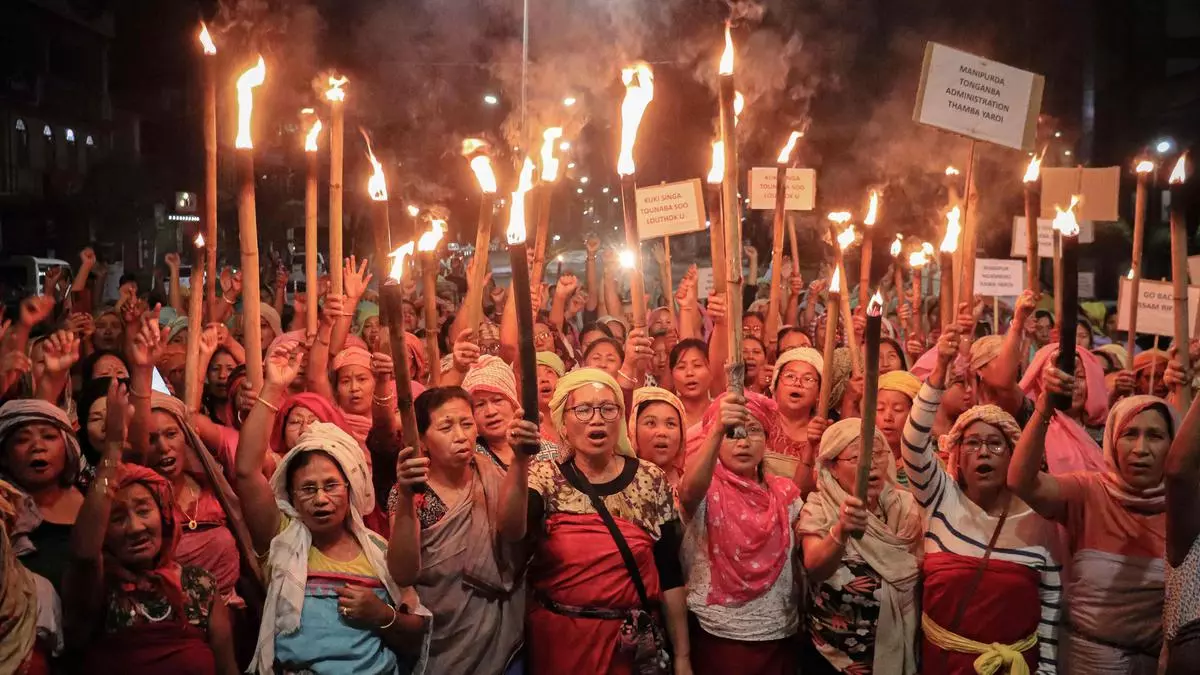Meira Paibis of Manipur are a testament of women solidarity. Also known as “Women Torch Bearers,” are a group of women activists in Manipur, a northeastern state of India. Their origins can be traced back to the 1970s, when they emerged as a powerful force against social injustices, human rights violations, and alcohol abuse. Over the years, the Meira Paibis have become an integral part of Manipuri society, playing a significant role in addressing various social and political issues.
The Meira Paibis movement began in the early 1970s in response to widespread social issues in Manipur, particularly alcohol abuse. During this period, many families were suffering due to the rampant sale and consumption of alcohol, leading to domestic violence and economic instability. Women, as the primary caregivers, bore the brunt of these problems and decided to take collective action.
The movement started with women patrolling their neighborhoods at night, carrying torches made from bamboo and cloth (meira), to identify and confront alcohol vendors and consumers. This vigilante-style action was aimed at curbing the social menace and protecting their families and communities. The sight of women with torches became a powerful symbol of resistance and solidarity, giving birth to the name “Meira Paibis.”
While the initial focus was on combating alcohol abuse, the scope of the Meira Paibis’ activities soon expanded. The women began addressing broader issues such as human rights violations, especially those related to the Armed Forces (Special Powers) Act (AFSPA), which grants special powers to the Indian military in conflict zones.
During the 1980s and 1990s, Manipur experienced severe political unrest and insurgency. The state’s population suffered from frequent clashes between insurgent groups and the military, leading to numerous human rights abuses. The Meira Paibis stepped in to protect their communities from these atrocities. They organized protests, sit-ins, and rallies demanding justice for victims of violence and calling for the repeal of AFSPA.
/newsdrum-in/media/media_files/zj4l2WMVup8pHbsxlpLg.jpg)
One of the most notable incidents involving the Meira Paibis was the protest against the killing of Thangjam Manorama in 2004. Manorama was allegedly raped and killed by personnel of the Assam Rifles, a paramilitary force. In response, twelve Meira Paibis staged a nude protest in front of the Kangla Fort, the Assam Rifles’ headquarters, holding banners that read “Indian Army Rape Us.” This dramatic act of defiance drew national and international attention to the human rights situation in Manipur and highlighted the courage and determination of the Meira Paibis.
Their persistent activism has led to several achievements. They have succeeded in bringing issues like human rights violations to the forefront of national discourse. They have also played a critical role in initiating dialogues between the government and insurgent groups, contributing to peacebuilding efforts in the region.
Today, the Meira Paibis continue to be a formidable force in Manipur. Their activities have evolved to include a wide range of social, political, and economic issues. They actively participate in community policing, monitoring and mediating local disputes to maintain peace and order. They also work towards the empowerment of women, promoting education, and addressing issues like domestic violence and substance abuse.
One of their significant ongoing campaigns is the fight against drug addiction, which has become a major problem in Manipur. The Meira Paibis conduct awareness programs, support rehabilitation efforts, and work with local authorities to curb the drug menace.
In addition to their grassroots activism, the Meira Paibis engage in political advocacy. They collaborate with other civil society organizations and human rights groups to lobby for policy changes. Their persistent demand for the repeal of AFSPA remains a central issue, as they continue to highlight the act’s impact on civilian lives.
The Meira Paibis operate in a decentralized and community-based manner. They do not have a formal hierarchical structure, which allows them to remain flexible and responsive to local needs. Each locality or village typically has its group of Meira Paibis, who organize meetings and activities based on the issues faced by their community.
Decisions are made collectively through discussions and consensus. This democratic approach ensures that the voices and concerns of all members are heard and addressed. The use of traditional practices and symbols, such as the meira (torch), helps to maintain a strong cultural connection and reinforces their identity as protectors of the community.
Despite their significant contributions, the Meira Paibis face several challenges. The political and security situation in Manipur remains complex, with ongoing conflicts between various insurgent groups and the state. This environment makes their work dangerous and often puts them at odds with both insurgents and security forces.
The decentralized nature of their organization, while a strength, also poses difficulties in terms of coordination and resource mobilization. Additionally, as they are primarily grassroots activists, they often lack the formal education and training that could enhance their effectiveness in certain areas.
Critics argue that the Meira Paibis’ methods can sometimes be too confrontational and that their focus on immediate issues may prevent them from addressing long-term structural problems. However, supporters contend that their approach is necessary given the urgent and often life-threatening nature of the challenges they face.
The Meira Paibis of Manipur are a testament to the power of grassroots activism and the strength of community solidarity. From their origins as a movement against alcohol abuse, they have evolved into a vital force addressing a wide range of social, political, and economic issues. Their courage and determination in the face of adversity have earned them respect and recognition both within India and internationally.
Despite the challenges they face, the Meira Paibis continue to work tirelessly for the betterment of their communities. Their ongoing efforts to combat human rights abuses, support women’s empowerment, and address social issues underscore their critical role in Manipur’s society. As they adapt to new challenges and expand their activities, the Meira Paibis remain a beacon of hope and resilience for the people of Manipur.
4o



Leave a Reply